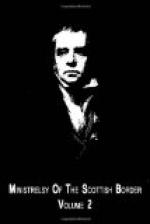When they came to the Lingly burn.—P. 27. v. 2. A brook, which falls into the Ettrick, from the north, a little above the Shaw burn.
They spy’d an aged father.—P. 27. v. 2. The traditional commentary upon the ballad states this man’s name to have been Brydone, ancestor to several families in the parish of Ettrick, particularly those occupying the farms of Midgehope and Redford Green. It is a strange anachronism, to make this aged father state himself at the battle of Solway flow, which was fought a hundred years before Philiphaugh; and a still stranger, to mention that of Dunbar, which did not take place till five years after Montrose’s defeat.
A tradition, annexed to a copy of this ballad, transmitted to me by Mr James Hogg, bears, that the earl of Traquair, on the day of the battle, was advancing with a large sum of money, for the payment of Montrose’s forces, attended by a blacksmith, one of his retainers. As they crossed Minch-moor, they were alarmed by firing, which the earl conceived to be Montrose exercising his forces, but which his attendant, from the constancy and irregularity of the noise, affirmed to be the tumult of an engagement. As they came below Broadmeadows, upon Yarrow, they met their fugitive friends, hotly pursued by the parliamentary troopers. The earl, of course, turned, and fled also: but his horse, jaded with the weight of dollars which he carried, refused to take the hill; so that the earl was fain to exchange with his attendant, leaving him with the breathless horse, and bag of silver, to shift for himself; which he is supposed to have done very effectually. Some of the dragoons, attracted by the appearance of the horse and trappings, gave chase to the smith, who fled up the Yarrow; but finding himself as he said, encumbered with the treasure, and unwilling that it should be taken, he flung it into a well, or pond, near the Tinnies, above Hangingshaw. Many wells were afterwards searched in vain; but it is the general belief, that the smith, if he ever hid the money, knew too well how to anticipate the scrutiny. There is, however, a pond, which some peasants began to drain, not long ago, in hopes of finding the golden prize, but were prevented, as they pretended, by supernatural interference.
THE GALLANT GRAHAMS.
The preceding ballad was a song of triumph over the defeat of Montrose at Philiphaugh; the verses, which follow are a lamentation for his final discomfiture and cruel death. The present edition of "The Gallant Grahams" is given from tradition, enlarged and corrected by an ancient printed edition, entitled, "The Gallant Grahams of Scotland" to the tune of "I will away, and I will not tarry," of which Mr Ritson favoured the editor with an accurate copy.




